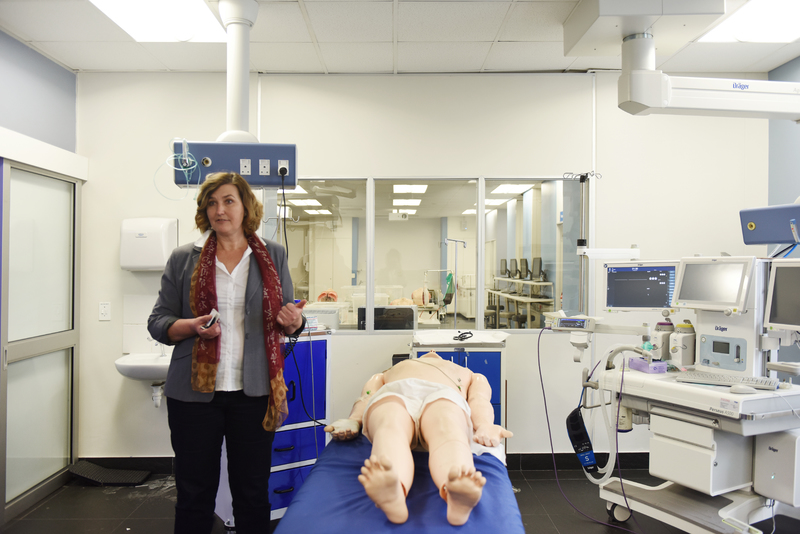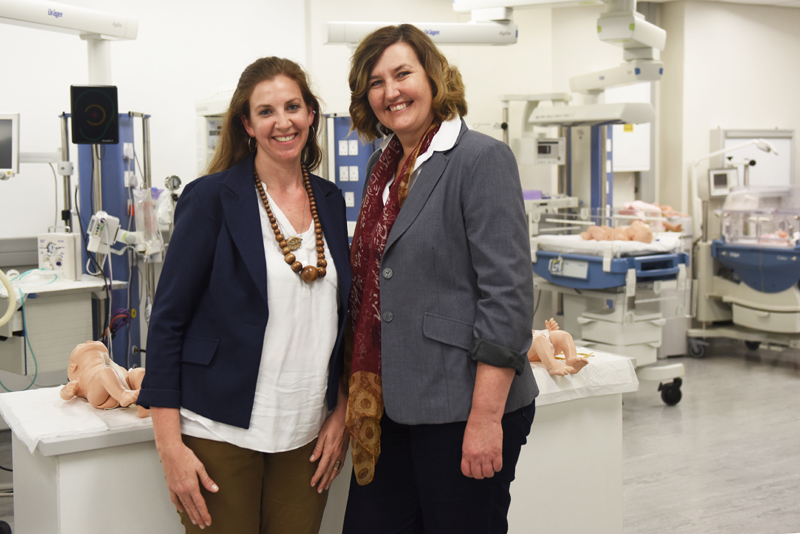Becoming partners in care.

Becoming partners in care
29 JUNE 2017 | STORY KATE-LYN MOORE. PHOTOS ROBYN WALKER.

Dr Rachel Weiss heads the Clinical Skills Centre at UCT. She is particularly concerned with training medical students in patient-centred communication.
Dr Rachel Weiss and Dr Natashia Muna, together with a team of colleagues from Health and Rehabilitation, Disability Studies, African Languages and the Intervention Programme, are forging a new path in medical teaching with the Patient Partner Programme.
The Patient Partner Programme has been funded by the Erasmus+ capacity building programme of the European Union as part of the Caring Society 3.0 (CASO) consortium.
The programme attempts to respond to the specific challenges of our South African context by addressing gaps in the current health sciences communication curricula.
Medical students interact minimally with patients for the first few years of study. By the time they can engage actively with patients, there are few opportunities for observation and feedback from staff members. More importantly, there are no formalised opportunities for constructive feedback from patients. Students may thus not be fully equipped to communicate effectively with patients from diverse contexts.
Weiss, who heads the Clinical Skills Centre and has a specific interest in patient-centred communication, believes that these gaps are especially problematic since many South African patients feel disempowered in the healthcare setting.
“Because of the large student numbers, patients are often seen by multiple students who need to ‘practise’ their communication and examination skills, with the patient’s consent of course. However, you have to understand ‘consent’ in the context of the history of our country and the socio-economic disparity still impacting our healthcare system,” she says.
‘The students need to learn’
In a 2012 study, Weiss and her colleagues found that some patients were being examined up to five times a day by groups of three to four students. Even though ‘consent’ was obtained in each case, the toll on patients was undeniable.
“When we followed up by asking patients, ‘If you are sick or sore, why don’t you just say no?’, the patients all said, ‘But the students must learn.’ ”
It is a catch-22 situation. Students need patient interaction to learn in a contextually appropriate way, but junior students can’t engage with patients before they have had the necessary training.
“In designing curricula, we must recognise that in this country we have issues around human rights, injustice and power that we need to consider,” she explains.
Which is why Weiss has been a long-time advocate of a simulated patient programme, albeit one with a different focus.
Unlike programmes prevalent in the United States (where a simulated patient is trained to take on a purposefully designed ‘personality’ and enact a given medical and social history relevant to a case), Weiss’s Patient Partner Programme is focused on the authentic representation of patients in the fullness of their personal, social and economic contexts.
Authentic engagement
“For us, the authenticity of someone’s real life is most important, because we want to tackle contextual issues that manifest in the healthcare encounter around power, privilege, gender,” she says.
Even though some simulation-related skills may be needed, patient partners will be trained mostly in listening skills and providing constructive feedback from a patient perspective.
This means that if a patient partner is a 35-year-old mother of three children, living in Khayelitsha and financially dependent on a social grant, she will bring this reality into the teaching cases with her, even though she may ‘present’ with a cough one day, or dizziness the next.
Patient partners are “experts by experience”, says Weiss. This project emphasises the value that both the patient and the healthcare practitioner bring into the dynamic.
“We would be completely naive if we thought we could ‘equalise’ the power between a patient (who may have limited education) and the medical specialist (who is most likely from a different socio-economic, cultural or even language background), especially since the patient is dependent on receiving help.
“However, we can train both parties to have respect for the experience the other person brings. Specialist medical knowledge and skills are essential, but they only have value if the patient participates consistently in the diagnostic and treatment process,” she explains.
Participation is jeopardised when patients experience ongoing side effects from treatment, or risk losing their jobs because of frequent clinic visits. In pursuing a favourable clinical outcome, the patient’s (lived) perspective is therefore as valuable as the doctor’s professional perspective.
Eliciting and understanding a patient’s perspective in the context of diversity requires skill. It requires training medical students to listen, to recognise culturally specific cues and to recognise when patients challenge a medical view or management that they would not follow, were it to be implemented anyway.
Within the programme, patient partners will help students practise their skills, provide constructive feedback and participate in the design of communication curricula and learning resources.
Student partners

Dr Rachel Weiss and Dr Natashia Muna are launching the Patient Partner Programme, which seeks to fill certain gaps in communication training.
The project also opens opportunities for student participation.
For the full story, follow this link: https://www.news.uct.ac.za/article/-2017-06-29-becoming-partners-in-care